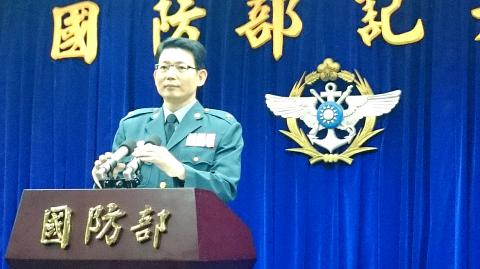The National Security Bureau (NSB) yesterday rejected a report that National Security Council Secretary-General King Pu-tsung (金溥聰) suggested that the military should intervene in and handle major demonstrations.
King was accused of overreaching his authority earlier this month when he visited the National Police Agency and the Ministry of Justice’s Investigation Bureau.
King, in a meeting with unnamed officials, was reported by the officials as asking police to toughen up in dealing with mass demonstrations, Democratic Progressive Party (DPP) Legislator Chiu Yi-ying (邱議瑩) said yesterday.

Photo: Taipei Times
In the face of large protests, the Ministry of National Defense should set up a command center to coordinate security missions, Chiu reported his sources as saying.
King allegedly added that military officials should be able to enter the police agency to direct security tasks.
Agency officials said that the officials at the meeting were surprised at King’s remarks, Chiu said.
“King infringed on the Constitution and now he is turning Taiwan into a military state,” Chiu said, accusing the Chinese Nationalist Party (KMT) government of regarding the public as enemies.
The bureau rebutted the report in a press statement later yesterday.
It said that suggestions were made by NSB Director-General Lee Hsiang-chou (李翔宙) who accompanied King to the meeting, in light of the incident on Jan. 25 in which truck driver Chang Te-cheng (張德正) allegedly drove his vehicle past barriers and up the front steps of the Presidential Office Building.
The statement said that Lee had suggested police should establish advanced warning, intelligence-gathering, and reporting and communications systems, as well as an inter-departmental coordination system to prevent similar incidents.
King did not say that the military should handle security issues during demonstrations, it said.
The statement reiterated that King’s visits were in accordance with the bureau’s Organic Act (國家安全局組織法) and the National Intelligence Services Act (國家情報工作法), which say that the bureau is responsible for directing and supporting intelligence and security agencies.
The police said in a statement that public demonstrations are handled by police in accordance with the Assembly and Parade Act (集會遊行法), and that King did not say that the military should take part in handling rallies.
Military spokesman David Lo (羅紹和) said yesterday that the military did not receive such orders as Chiu had reported.

DAREDEVIL: Honnold said it had always been a dream of his to climb Taipei 101, while a Netflix producer said the skyscraper was ‘a real icon of this country’ US climber Alex Honnold yesterday took on Taiwan’s tallest building, becoming the first person to scale Taipei 101 without a rope, harness or safety net. Hundreds of spectators gathered at the base of the 101-story skyscraper to watch Honnold, 40, embark on his daredevil feat, which was also broadcast live on Netflix. Dressed in a red T-shirt and yellow custom-made climbing shoes, Honnold swiftly moved up the southeast face of the glass and steel building. At one point, he stepped onto a platform midway up to wave down at fans and onlookers who were taking photos. People watching from inside

A Vietnamese migrant worker yesterday won NT$12 million (US$379,627) on a Lunar New Year scratch card in Kaohsiung as part of Taiwan Lottery Co’s (台灣彩券) “NT$12 Million Grand Fortune” (1200萬大吉利) game. The man was the first top-prize winner of the new game launched on Jan. 6 to mark the Lunar New Year. Three Vietnamese migrant workers visited a Taiwan Lottery shop on Xinyue Street in Kaohsiung’s Gangshan District (崗山), a store representative said. The player bought multiple tickets and, after winning nothing, held the final lottery ticket in one hand and rubbed the store’s statue of the Maitreya Buddha’s belly with the other,

‘NATO-PLUS’: ‘Our strategic partners in the Indo-Pacific are facing increasing aggression by the Chinese Communist Party,’ US Representative Rob Wittman said The US House of Representatives on Monday released its version of the Consolidated Appropriations Act, which includes US$1.15 billion to support security cooperation with Taiwan. The omnibus act, covering US$1.2 trillion of spending, allocates US$1 billion for the Taiwan Security Cooperation Initiative, as well as US$150 million for the replacement of defense articles and reimbursement of defense services provided to Taiwan. The fund allocations were based on the US National Defense Authorization Act for fiscal 2026 that was passed by the US Congress last month and authorized up to US$1 billion to the US Defense Security Cooperation Agency in support of the

‘COMMITTED TO DETERRENCE’: Washington would stand by its allies, but it can only help as much as countries help themselves, Raymond Greene said The US is committed to deterrence in the first island chain, but it should not bear the burden alone, as “freedom is not free,” American Institute in Taiwan Director Raymond Greene said in a speech at the Institute for National Defense and Security Research’s “Strengthening Resilience: Defense as the Engine of Development” seminar in Taipei yesterday. In the speech, titled “Investing Together and a Secure and Prosperous Future,” Greene highlighted the contributions of US President Donald Trump’s administration to Taiwan’s defense efforts, including the establishment of supply chains for drones and autonomous systems, offers of security assistance and the expansion of